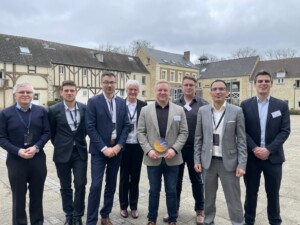Resource efficient processing
The ZeroWaste Cluster, an innovation project funded by EIT RawMaterials, is a cooperation of eight different Networks of Infrastructures (NoIs). These networks contribute to foster innovation in the field of efficient resource processing and focus primarily on waste streams and/or complex low-grade ores. The ZeroWaste cluster also offers sustainability modelling services enabling its customers to take strategic decisions favouring the transition towards a circular economy.
A Network of Infrastructure project is an accelerator aiming, on the one hand, at mapping infrastructure and services available within the consortium and, on the other hand, at providing the users with access to facilities and expert knowledge. The infrastructures include pilot plants, technical centres as well as analytical and modelling tools. The ZeroWaster cluster is composed of more than 40 internationally renowned institutions (Universities, Research centers and Industry) of which many are partners of the EIT RawMaterials.
The main achievements of the ZeroWaste Cluster are:
- It is the only cluster with an official EIP Commitment (European Innovation Partnership), coordinated by VITO. See link.
- It embraces a flexible toolbox combining physical pre- and post-treatment and separation, solvo-, electro-, bio-, and pyro-metallurgy for the sustainable recovery of valuable materials from complex, low grade ores and wastes, together with technologies to valorise the residual matrix materials.
Impacts of partners cooperation/sharing expertise and knowledge
A resource efficient growth path would bring varied benefits as explained in the analysis associated with the European Commission Roadmap to a Resource Efficient Europe:
- Improved productivity, as businesses reduce costs and so improve their competitiveness;
- Growth and job creation by a faster pace of technological and organisational change;
- Environmental benefits and resilience by the improved management of resources;
- Macroeconomic stability by reducing the security of supply issues, market volatility in important resources and so reducing pressures from asymmetries within the Eurozone.
In addition to strong environmental impact, the ZeroWaste Cluster is economically driven by mitigating costs related to low grade ores and industrial wastes. Targeting overall optimum value creation by valuable material recovery and residue valorisation, the ZeroWaste Cluster will be a key enabler for:
- Exploiting the EU industrial waste streams by the recovery of technology metals and upcycling of residues;
- Attract and exploit global selected material streams for added-value conversion;
- The provision of quality secondary resources to the EU manufacturing and processing sectors;
- Global export of technology for industrial waste recycling as well as for the mining of primary low grade, complex ores (thereby precluding technology drain by adequate IPR protection);
- Consequent increased and sustainable job creation in the EU mining, material processing and recycling sectors.
Furthermore, the ZeroWaste Cluster will reduce energy consumption by optimised processing of residual materials.
The following organisations are active in one or more NoIs within the ZeroWaste Cluster:
Aalto University, Arkema, ASTER, Bay Zoltan, Bureau de Recherches Géologiques et Miniéres (BRGM), Chalmers University, CNR, CRM, CSIC, Ecoinnovazione, ENEA, EC-JRC, Geological Survey of Denmark and Greenland (GEUS), Ghent University, HZDR, InsPyro, Instytut Metali Niezelaznych (IMN), IVL Swedish Environmental Research Institute, KTH, KU Leuven, Lappeenranta University of Technology, Leiden University, Luleå University of Technology, MEAM, Montanuniversität Leoben, National Technical University of Athens, Outotec, RISE, Rusal Aughinish, RWTH Aachen, Tecnalia, TNO, TU Freiberg, TU Delft, University of Liège, Umicore, Université de Bordeaux, University of Limerick, University of Oulu, VITO, VTT, Wetsus, Wuppertal Institute, ZAG.
Read more:
- ZeroWaste Cluster website
- EIT RawMaterials Commitment ZeroWaste Networks of Infrastructure
- ZeroWaste Cluster dedicated project pages: Inspire, PreFlex, BioFlex, ElectroFlex, PyroFlex, SolvoFlex, ResiduFlex, SSIC




